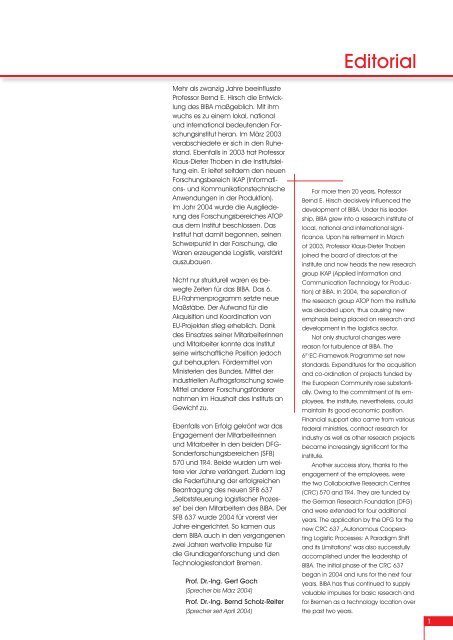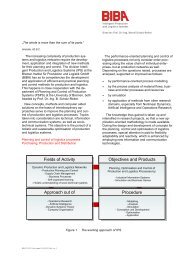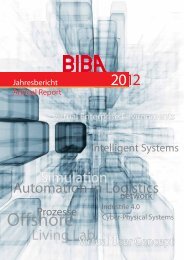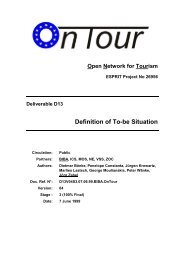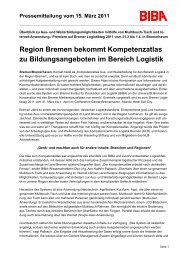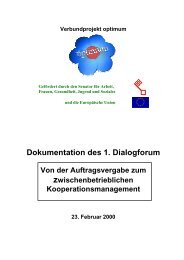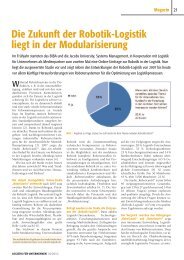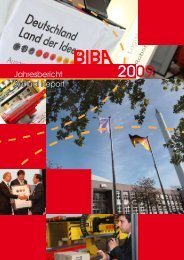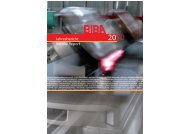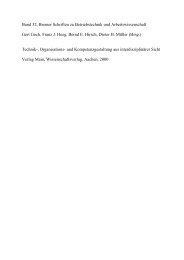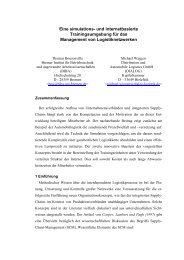Jahresbericht 2003/2004 - Biba - Universität Bremen
Jahresbericht 2003/2004 - Biba - Universität Bremen
Jahresbericht 2003/2004 - Biba - Universität Bremen
Sie wollen auch ein ePaper? Erhöhen Sie die Reichweite Ihrer Titel.
YUMPU macht aus Druck-PDFs automatisch weboptimierte ePaper, die Google liebt.
Mehr als zwanzig Jahre beeinflusste<br />
Professor Bernd E. Hirsch die Entwicklung<br />
des BIBA maßgeblich. Mit ihm<br />
wuchs es zu einem lokal, national<br />
und international bedeutenden Forschungsinstitut<br />
heran. Im März <strong>2003</strong><br />
verabschiedete er sich in den Ruhestand.<br />
Ebenfalls in <strong>2003</strong> trat Professor<br />
Klaus-Dieter Thoben in die Institutsleitung<br />
ein. Er leitet seitdem den neuen<br />
Forschungsbereich IKAP (Informations-<br />
und Kommunikationstechnische<br />
Anwendungen in der Produktion).<br />
Im Jahr <strong>2004</strong> wurde die Ausgliederung<br />
des Forschungsbereiches ATOP<br />
aus dem Institut beschlossen. Das<br />
Institut hat damit begonnen, seinen<br />
Schwerpunkt in der Forschung, die<br />
Waren erzeugende Logistik, verstärkt<br />
auszubauen.<br />
Nicht nur strukturell waren es bewegte<br />
Zeiten für das BIBA. Das 6.<br />
EU-Rahmenprogramm setzte neue<br />
Maßstäbe. Der Aufwand für die<br />
Akquisition und Koordination von<br />
EU-Projekten stieg erheblich. Dank<br />
des Einsatzes seiner Mitarbeiterinnen<br />
und Mitarbeiter konnte das Institut<br />
seine wirtschaftliche Position jedoch<br />
gut behaupten. Fördermittel von<br />
Ministerien des Bundes, Mittel der<br />
industriellen Auftragsforschung sowie<br />
Mittel anderer Forschungsförderer<br />
nahmen im Haushalt des Instituts an<br />
Gewicht zu.<br />
Ebenfalls von Erfolg gekrönt war das<br />
Engagement der Mitarbeiterinnen<br />
und Mitarbeiter in den beiden DFG-<br />
Sonderforschungsbereichen (SFB)<br />
570 und TR4. Beide wurden um weitere<br />
vier Jahre verlängert. Zudem lag<br />
die Federführung der erfolgreichen<br />
Beantragung des neuen SFB 637<br />
„Selbststeuerung logistischer Prozesse“<br />
bei den Mitarbeitern des BIBA. Der<br />
SFB 637 wurde <strong>2004</strong> für vorerst vier<br />
Jahre eingerichtet. So kamen aus<br />
dem BIBA auch in den vergangenen<br />
zwei Jahren wertvolle Impulse für<br />
die Grundlagenforschung und den<br />
Technologiestandort <strong>Bremen</strong>.<br />
Prof. Dr.-Ing. Gert Goch<br />
(Sprecher bis März <strong>2004</strong>)<br />
Prof. Dr.-Ing. Bernd Scholz-Reiter<br />
(Sprecher seit April <strong>2004</strong>)<br />
Editorial<br />
For more then 20 years, Professor<br />
Bernd E. Hirsch decisively influenced the<br />
development of BIBA. Under his leadership,<br />
BIBA grew into a research institute of<br />
local, national and international significance.<br />
Upon his retirement in March<br />
of <strong>2003</strong>, Professor Klaus-Dieter Thoben<br />
joined the board of directors at the<br />
institute and now heads the new research<br />
group IKAP (Applied Information and<br />
Communication Technology for Production)<br />
at BIBA. In <strong>2004</strong>, the seperation of<br />
the research group ATOP from the institute<br />
was decided upon, thus causing new<br />
emphasis being placed on research and<br />
development in the logistics sector.<br />
Not only structural changes were<br />
reason for turbulence at BIBA. The<br />
6th EC-Framework Programme set new<br />
standards. Expenditures for the acquisition<br />
and co-ordination of projects funded by<br />
the European Community rose substantially.<br />
Owing to the commitment of its employees,<br />
the institute, nevertheless, could<br />
maintain its good economic position.<br />
Financial support also came from various<br />
federal ministries, contract research for<br />
industry as well as other research projects<br />
became increasingly significant for the<br />
institute.<br />
Another success story, thanks to the<br />
engagement of the employees, were<br />
the two Collaborative Research Centres<br />
(CRC) 570 and TR4. They are funded by<br />
the German Research Foundation (DFG)<br />
and were extended for four additional<br />
years. The application by the DFG for the<br />
new CRC 637 „Autonomous Cooperating<br />
Logistic Processes: A Paradigm Shift<br />
and its Limitations“ was also successfully<br />
accomplished under the leadership of<br />
BIBA. The initial phase of the CRC 637<br />
began in <strong>2004</strong> and runs for the next four<br />
years. BIBA has thus continued to supply<br />
valuable impulses for basic research and<br />
for <strong>Bremen</strong> as a technology location over<br />
the past two years.<br />
1


